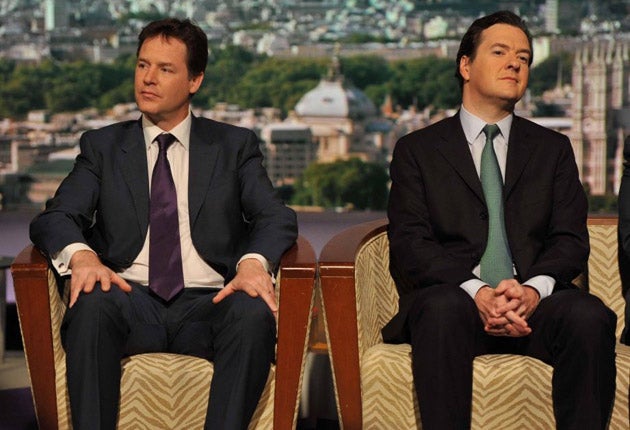Lib Dems must be assertive, says Nick Clegg

Nick Clegg began the task of creating distance between his Liberal Democrats and their Conservative coalition partners today by declaring that the current Government is a "coalition of necessity, not of conviction".
In a speech to mark today's first anniversary of the coalition, the Deputy Prime Minister insisted he was "absolutely right" to join forces with Tories to tackle the UK's economic crisis.
But he said that, after being given a "bloody nose" by voters in last week's elections, it was time for his party to be more assertive within Government, and to blow its own trumpet more when it wins policy battles over Tories.
Borrowing a phrase from Prime Minister David Cameron, Mr Clegg promised a more "muscular liberalism" in the months and years to come.
"We can... be more assertive about our different positions on certain issues, but without threatening the stability of the Government," he said.
"In the next phase of the coalition, both partners will be able to be clearer in their identities, but equally clear about the need to support Government and government policy. We will stand together, but not so closely that we stand in each other's shadow.
"You will see a strong liberal identity in a strong coalition Government. You might even call it muscular liberalism."
Mr Clegg dismissed talk of a "realignment" of politics, insisting the Lib Dems were still a distinct party with different values from both the Conservatives and Labour.
Despite last week's setbacks, his party remained in a strong position to win millions of votes in the 2015 general election, he said.
And in a clear message to activists uneasy about working together with their traditional foes, the Lib Dem leader insisted there would "never again" be a return to the policies of Margaret Thatcher's administration of the 1980s.
He put some of the blame for the Lib Dems' setbacks in Scotland and northern cities in last week's elections on the "deep, visceral memories" of the 1980s and the fear that these areas would once again be "economically... left for dead" as the Government cuts back on spending.
But he declared: "The '80s won't happen again. We are not in government to turn back the clock, but to move forward to a better, stronger and more balanced economy.
"In the Thatcher years, whole communities were uprooted. Because too many areas were dependent on just one industry, economic upheaval led to social upheaval. Industries went, and communities went with them. Never again."
The coalition entered its second year at a low point in the polls, with almost half (49%) of voters saying it has been bad for Britain and more than half (53%) rating its record so far as disappointing.
The Deputy Prime Minister has taken the brunt of voters' anger, with 63% of those questioned by ComRes for the ITV News poll saying they do not trust him, and more than half (59%) agreeing he has overseen a sell-out of Lib Dem principles.
Just 24% agreed he was a good leader for his party and one in three (33%) thought he should quit.
Mr Clegg's deputy, Simon Hughes, suggested this morning that he could stay on as DPM even if he was removed as party leader, but told BBC Radio 5 Live: "He's not going to be ousted; he's the first Liberal leader to take us into Government for 65 years, so he's secure.
"We've had our parliamentary meeting last night, there wasn't a suggestion from any single colleague that he should step aside, so Nick has been reaffirmed."
In his speech at the National Liberal Club in London, Mr Clegg acknowledged that coalition had meant Lib Dems losing some flagship policies, like holding down university tuition fees, but said that in other areas the party had been "punching above our weight" - getting 75% of its manifesto programme into the coalition agreement, against 60% for the Tories.
He said he had not doubted "for a single moment" that going into coalition was the right decision and said the experience of the last year had "killed stone dead" the political prejudice that coalitions provide weak government.
And he also tackled the claim that Lib Dems risk being marginalised by being the junior partner in a coalition with Tories.
Directing some barbs at his coalition partners - whom he described as more "tribal" and less "committed at heart to fairness" than the Lib Dems - Mr Clegg insisted that his party still had a distinct voice.
"Having created a strong, stable Government and set out credible plans to cut the deficit, I relish the opportunity to provide a louder Liberal Democrat voice, to make the Liberal Democrat imprint and influence on Government more visible," he said.
"And we will stand our ground in the liberal centre of British politics. Not the anti-Tory party, or the anti-Labour party, or the anti-politics party. A party of enterprise and fairness. A party that thinks we can do more together than we can alone."
And, in remarks which he admitted might sound over-optimistic after last week's mauling at the polls, he added: "At the next election, we will say that we are demonstrably more credible on the economy than Labour, and more committed at heart to fairness than the Conservatives.
"I am confident that by showing we can combine economic soundness with social justice - competence with a conscience - we will be an even more formidable political force in the future.
"I am convinced that there are millions of people who want a liberal politics of the centre."
Join our commenting forum
Join thought-provoking conversations, follow other Independent readers and see their replies
Comments
Bookmark popover
Removed from bookmarks